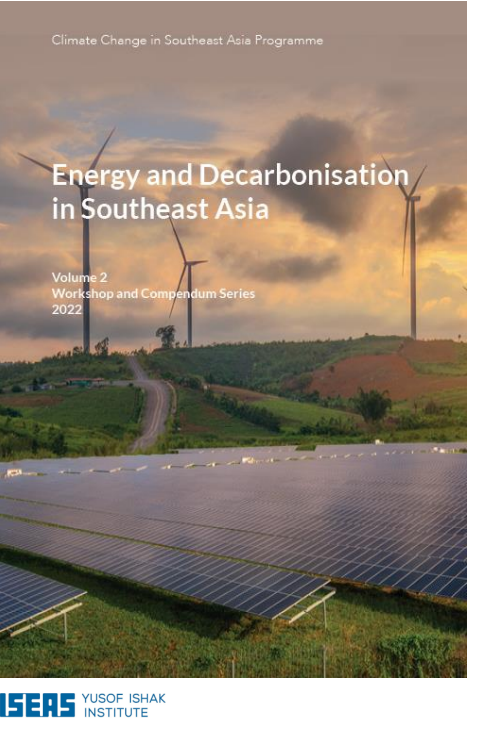The Climate Change in Southeast Asia Programme at the ISEAS – Yusof Ishak Institute invites policymakers, scholars, and practitioners to submit their papers on a chosen topic for Energy and Decarbonization in Southeast Asia (planned publication in last quarter of 2023).
Southeast Asian countries face the difficult task of securing affordable, accessible and sustainable energy supplies to meet projected population and economic growth, while facilitating rapid decarbonization across multiple sectors to meet climate goals. In recent years, policymakers have implemented several strategies aimed at increasing the deployment of renewable energy and harnessing natural resources and technologies for decarbonization. Yet, the continued use of highly-pollutant fossil fuels in the electricity generation sector in Southeast Asian countries and the continued degradation of natural carbon sinks such as forests and peatlands have undermined Paris Agreement goals.
Southeast Asia has enormous potential for the development of renewable energy. According to the International Energy Agency’s Southeast Asian Outlook 2021, Southeast Asia has sufficient renewable energy to power itself. There are significant untapped hydropower resources in Myanmar and Lao PDR, wind power in Vietnam and biofuel stocks in Indonesia and the Philippines. The region is also home to around 60% of the world’s tropical peatlands, which provides a natural source of carbon sink and storage.
However, energy transition and decarbonization efforts in Southeast Asia face a number of critical challenges, such as the lack of finance, slow uptake of existing technologies, fossil fuel subsidies, inconsistent regulatory frameworks, lack of political will, poor governance and corruption, among many reasons. Due to these impediments, Southeast Asian countries largely continue to follow the conventional path of development, which requires the utilization of fossil fuels and the degradation of natural resources.
Contributors are expected to write an article of not more than 6000 words on a chosen topic for Energy and Decarbonization in Southeast Asia, to be published in late 2023. They will also present their paper at an online workshop scheduled between September to October 2022.
ISEAS Yusof Ishak Institute will consider submissions on a broad range of topics on energy and decarbonization in Southeast Asia, including but not limited to:
- Regional cooperation: Studies on cooperation between Southeast Asian countries on the ASEAN Power Grid, regional energy trade, cross-border technical cooperation, regional forest conservation and peatland restoration Programmes. Authors are encouraged to identify pathways of expanding current levels of regional cooperation on energy and decarbonization.
- Best practices and lessons learned: Case studies on specific national policies or projects on energy transition or decarbonization that highlight best practices as well as lessons learned. Topics can include national energy or environmental policies as well as specific hydropower, wind, solar, or geothermal projects, reforestation and peatland restoration projects.
- Innovative and technological breakthroughs: Analysis of new developments in renewable energy technology, energy efficiency, big data, digitalization, carbon capture and storage, nature-based climate solutions and environmental advocacy. Authors are encouraged to emphasize the social, political, economic or environmental impacts of innovations or technological breakthroughs.
- Green Finance: Studies on addressing the gaps in green finance, including carbon markets, role of businesses and multinational corporations, green and blue bonds, carbon border adjustment mechanisms, carbon taxes, incentives/disincentives mechanisms for renewable energy transformation and fossil fuel subsidy reform. Authors are encouraged to avoid technical language and explain policy implications of developments in green finance in layman terms.
Following a selection process, contributors will be invited to submit their first draft and attend the online workshop. The deadline for the completed article is one month after the workshop. All submissions must be original and not published previously in any format. Completed articles will be accepted for publication if specified criteria and editorial requirements are met.

